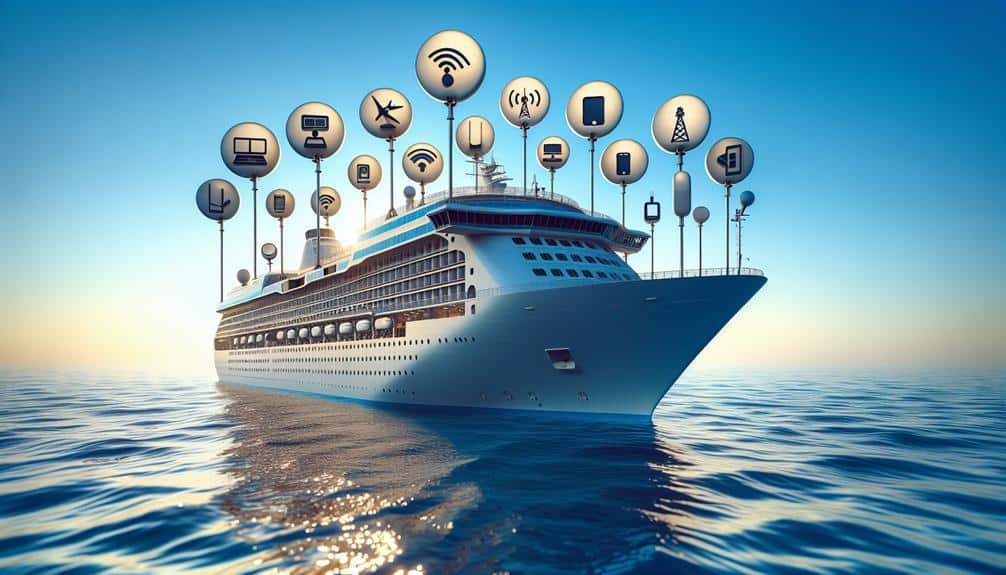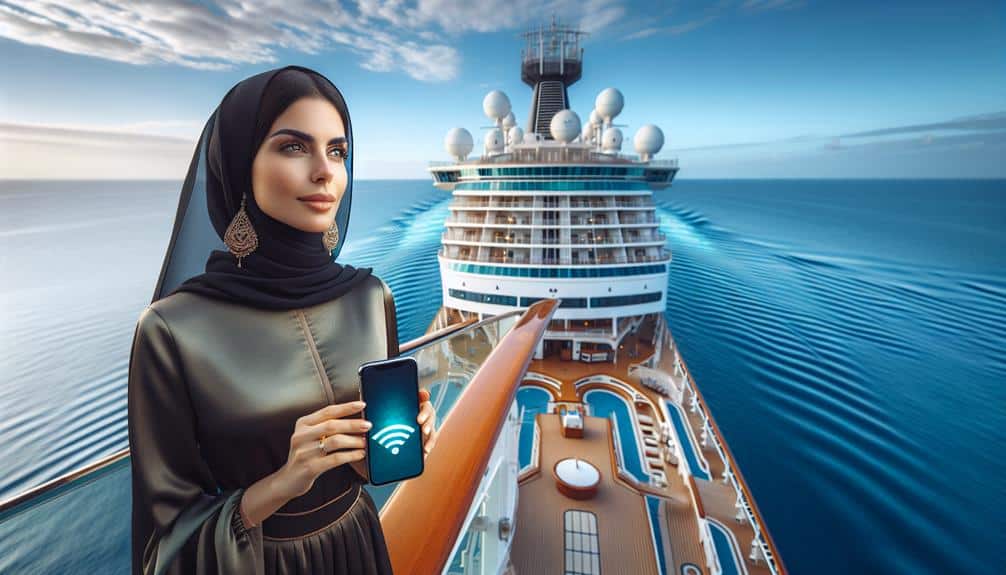To optimize cruise ship internet for smooth sailing, consider bandwidth limitations and implement network optimization techniques. Bandwidth restrictions are due to satellite capacity, causing congestion and slower speeds. Factors affecting speed include satellite coverage, signal strength, latency, and weather. Maximize connectivity with signal boosters, suitable data packages, and positioning near Wi-Fi access points. Manage data consumption strategically with allocation and limits, and prioritize ship functions with QoS protocols. Future trends involve advanced technology for better coverage, cybersecurity, and 5G integration. Enhance your cruise internet experience by understanding these factors and applying tips for improved connectivity.
Key Points
- Utilize network optimization techniques for improved connectivity.
- Invest in signal boosters compatible with the ship's network.
- Choose suitable data packages based on usage needs.
- Position closer to ship Wi-Fi access points for better reception.
- Manage data consumption strategically for high-quality service.
Understanding Cruise Ship Internet Bandwidth
To maximize your browsing experience at sea, grasp the intricacies of cruise ship internet bandwidth. Bandwidth limitations on cruise ships are a result of the finite capacity of the satellite connection serving the vessel. Network congestion occurs when too many users attempt to access the internet simultaneously, leading to slower speeds for all users on board. Understanding these factors is essential for optimizing your internet usage while cruising.
Bandwidth limitations dictate the maximum amount of data that can be transmitted over the ship's internet connection at any given time. This means that even if you have a high-speed package, your actual browsing experience may be affected by the total number of users online concurrently. Network congestion exacerbates this issue, as the shared connection struggles to accommodate the data demands of all passengers and crew.
Factors Affecting Internet Speed at Sea
Understanding the factors that impact internet speed while at sea is essential for optimizing your browsing experience on a cruise ship. Satellite coverage plays a critical role in determining internet connectivity. The ship's ability to maintain a clear line of sight with the satellite affects the strength of the signal received, directly influencing the speed of your connection. Additionally, latency, the time it takes for data to travel between your device and the satellite, can impact the responsiveness of your browsing sessions.
Weather conditions also play a significant role in internet speed at sea. Stormy weather or heavy rain can interfere with satellite signals, leading to slower speeds and potential interruptions in service. Moreover, signal strength can fluctuate based on the ship's location and orientation relative to the satellite, affecting the overall performance of the internet connection onboard.
Tips for Maximizing Cruise Ship Connectivity
For prime cruise ship connectivity, implementing network optimization techniques is essential. Signal boosters can greatly enhance your internet connection while at sea. These devices amplify weak signals, improving data transmission speeds and overall reliability. When choosing signal boosters, opt for ones compatible with your cruise ship's network frequencies to guarantee maximum effectiveness.
Another important tip is to invest in suitable data packages offered by the cruise line. These packages are designed to provide you with sufficient data at a reasonable cost. By selecting the right package based on your internet usage needs, you can avoid unexpected charges and enjoy seamless connectivity throughout your voyage.
Additionally, consider positioning yourself closer to the ship's Wi-Fi access points for better signal reception. Being in proximity to these access points can help you achieve faster internet speeds and a more stable connection. By following these tips and leveraging signal boosters and data packages, you can optimize your cruise ship connectivity for a smoother online experience.
Managing Bandwidth Usage on Cruise Ships
Maximizing bandwidth efficiency on cruise ships entails strategically managing data consumption to guarantee high-quality connectivity for all passengers. Bandwidth allocation plays a vital role in ensuring that internet services onboard run smoothly. By setting data consumption limits for individual users, cruise ship operators can prevent any one passenger from monopolizing the available bandwidth. This practice helps distribute the available resources equitably among all guests, enhancing the overall internet experience for everyone onboard.
To effectively manage bandwidth usage, cruise ships employ advanced network monitoring tools that track data consumption in real-time. By analyzing this data, operators can identify any anomalies or excessive bandwidth usage by specific users and take corrective actions promptly. Additionally, implementing Quality of Service (QoS) protocols allows for prioritizing mission-critical ship operations over non-essential internet activities, further optimizing bandwidth utilization.
Future Trends in Cruise Ship Internet Technology
To enhance the connectivity experience for passengers aboard cruise ships, upcoming advancements in internet technology are poised to revolutionize onboard communication and data access. Connectivity innovations in the maritime industry are paving the way for faster and more reliable internet connections at sea. One of the most exciting trends is the integration of satellite technology with onboard systems, ensuring seamless coverage even in remote areas. Maritime connectivity advancements are also focusing on enhancing cybersecurity measures to protect passenger data while providing efficient internet services.
Moreover, future developments include the use of advanced antennas and signal boosting techniques to optimize signal strength and minimize disruptions. Virtual private networks (VPNs) are being tailored to meet the specific needs of cruise ship passengers, offering secure and private browsing experiences. Additionally, the implementation of 5G technology is on the horizon, promising lightning-fast speeds and low latency for enhanced online activities while cruising. These cutting-edge advancements signify a bright future for cruise ship internet technology, promising smoother sailing for passengers seeking seamless connectivity at sea.
Frequently Asked Questions
Can I Use Video Chat Apps Like Facetime or Skype on a Cruise Ship's Internet Connection?
Yes, you can utilize video chat apps like FaceTime or Skype on a cruise ship's internet connection. However, due to bandwidth limitations and connectivity issues, consider video call etiquette and explore alternative communication methods as backups for smooth communication.
Are There Any Restrictions on Downloading Large Files or Streaming Videos on Cruise Ship Internet?
When it comes to cruise ship internet, there are bandwidth limitations that may impose restrictions on downloading large files or streaming videos. Be mindful of these streaming restrictions to guarantee a smoother internet experience onboard.
How Secure Is the Internet Connection on a Cruise Ship in Terms of Protecting Personal Data and Information?
When it comes to securing your personal data on a cruise ship, data encryption plays an essential role in safeguarding against cyber threats. Privacy concerns and online safety are top priorities, ensuring a secure internet connection.
Are There Any Options for Purchasing a Higher Bandwidth Package on a Cruise Ship for Faster Internet Speeds?
To get faster internet speeds on a cruise ship, you can purchase higher bandwidth options. These packages offer increased data capacity, ensuring smoother online experiences. Upgrade for quicker downloads, seamless streaming, and improved overall connectivity.
Can I Use My Own Personal Wi-Fi Hotspot Device on a Cruise Ship to Improve Internet Connectivity for Multiple Devices?
Yes, you can utilize your personal Wi-Fi hotspot device on a cruise ship to boost internet connectivity for multiple devices. Validate network compatibility to prevent issues. Also, be cautious of data usage limits to avoid surpassing allocated bandwidth.



